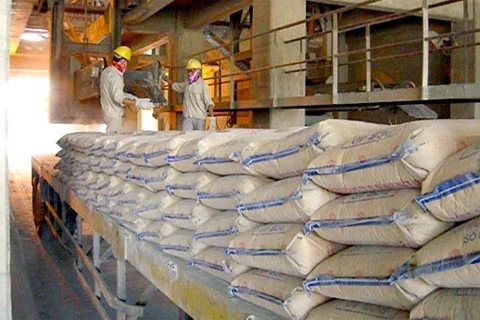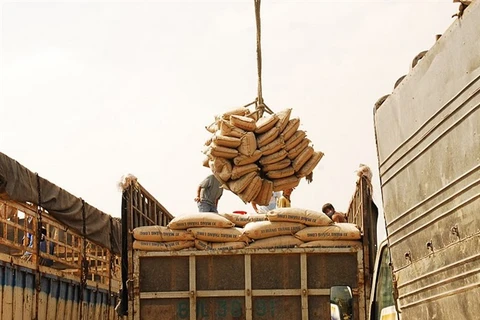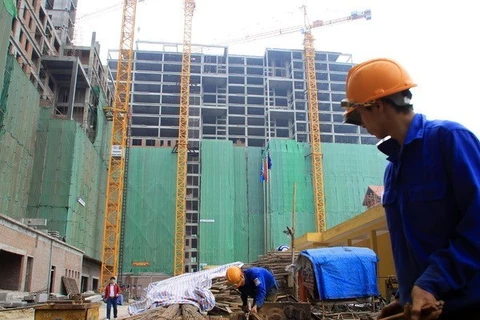Hanoi (VNA) - Holcim Vietnam was renamed Siam City Cement Vietnam Co Ltd after being acquired by Thailand’s Siam Cement City Public Co Ltd (SCCC).
A few months ago, Lafarge Holcim Group signed a deal to sell a 65percent stake in Holcim Vietnam to SCCC for 580 million USD. Holcim products will hereafter be marketed under the INSEE brand.
Recently SCG Cement-Building Materials Co Ltd, a subsidiary of the Siam Cement Group (SCG), bought the shares of Vietnam Construction Materials JSC for 156 million USD.
The significance of the Thai investors’ multi-million-dollar deals is that the Vietnamese cement industry remains very attractive to foreign investors though it is now mired in difficulties.
Analysts said acquisitions were much cheaper for the Thai companies than building their own factories.
Building a new factory in Vietnam will cost 170-180 USD per tonne of cement produced. Acquisitions bring down the cost to 105-110 USD.
Besides, with their financial and administrative advantages, Thai companies can easily take on their Vietnamese rivals.
A construction ministry official said it was inevitable that foreign companies would invest in the Vietnamese cement industry considering the enormous opportunities it offers them.
The strong recovery in the real estate market and the resumption of many major construction projects are an important reason for the rise in demand for building materials.
How do Vietnamese cement companies benefit from these M&A deals?
According to the Vietnam Association of Finance Investors, one of the many benefits is that Vietnamese cement companies will have access to massive resources to improve their technology and equipment and management and expand export markets by taking advantage of the distribution systems of their foreign investors.
It said further that to attract foreign investors in the cement industry, the Government should remove the foreign ownership cap in the industry, which is now at 49 percent.
The Vietnam Construction Association did not oppose the M&A deals by foreigners but nevertheless warned the Government not to allow foreign businesses to take advantage of the current difficult situation in the industry to take over domestic companies. That would affect the country’s interests, it said.
The Vietnam Materials Association concurred saying the Government should not let Vietnamese cement companies become a mere source of raw materials, energy and labour for foreign companies.
It said local companies should be restructured to become competitive and take control of the market.-VNA
A few months ago, Lafarge Holcim Group signed a deal to sell a 65percent stake in Holcim Vietnam to SCCC for 580 million USD. Holcim products will hereafter be marketed under the INSEE brand.
Recently SCG Cement-Building Materials Co Ltd, a subsidiary of the Siam Cement Group (SCG), bought the shares of Vietnam Construction Materials JSC for 156 million USD.
The significance of the Thai investors’ multi-million-dollar deals is that the Vietnamese cement industry remains very attractive to foreign investors though it is now mired in difficulties.
Analysts said acquisitions were much cheaper for the Thai companies than building their own factories.
Building a new factory in Vietnam will cost 170-180 USD per tonne of cement produced. Acquisitions bring down the cost to 105-110 USD.
Besides, with their financial and administrative advantages, Thai companies can easily take on their Vietnamese rivals.
A construction ministry official said it was inevitable that foreign companies would invest in the Vietnamese cement industry considering the enormous opportunities it offers them.
The strong recovery in the real estate market and the resumption of many major construction projects are an important reason for the rise in demand for building materials.
How do Vietnamese cement companies benefit from these M&A deals?
According to the Vietnam Association of Finance Investors, one of the many benefits is that Vietnamese cement companies will have access to massive resources to improve their technology and equipment and management and expand export markets by taking advantage of the distribution systems of their foreign investors.
It said further that to attract foreign investors in the cement industry, the Government should remove the foreign ownership cap in the industry, which is now at 49 percent.
The Vietnam Construction Association did not oppose the M&A deals by foreigners but nevertheless warned the Government not to allow foreign businesses to take advantage of the current difficult situation in the industry to take over domestic companies. That would affect the country’s interests, it said.
The Vietnam Materials Association concurred saying the Government should not let Vietnamese cement companies become a mere source of raw materials, energy and labour for foreign companies.
It said local companies should be restructured to become competitive and take control of the market.-VNA
VNA























